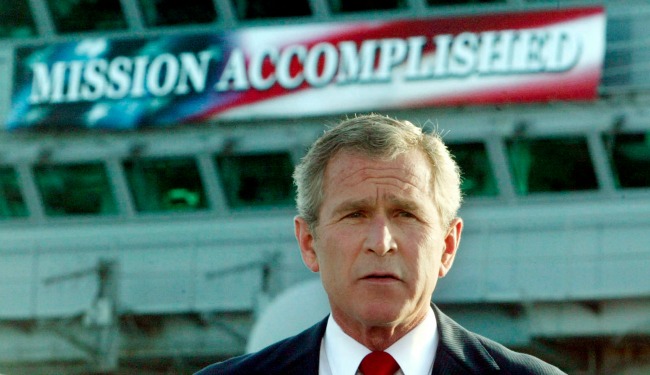Is there a more self-congratulatory nation than the United States? When it comes to self-congratulations, we’re number one.
If there is true American exceptionalism, it is, among other things, that we are exceptionally congratulatory of ourselves.
Perhaps the most well-known example was the large “Mission Accomplished” banner behind President George W. Bush on the aircraft carrier USS Lincoln on May 1, 2003 as he said, “In the Battle of Iraq, the United States and our allies have prevailed.” Larry Downing/Reuters
Larry Downing/Reuters
More recently we have the twin cases of Cliven Bundy and Donald Sterling to make us feel good about ourselves.
The past two weeks have been Bundy’s 15 minutes of fame. Here is someone who thinks refusing to pay grazing fees for his cattle herd to the government is taking the high moral ground, as opposed to those on welfare who fail to report some outside income they earned.
And, when the government comes calling, he gets a few of his friends with weapons together, forcing the federal employees to either risk a blood bath a la Waco or retreat, to the applause of Fox News and others on the Right.
Among the gems from Mr. Bundy was denouncing the legitimacy of the US Government while standing in front of an American flag. No single mother on welfare could have shown more ignorance than Mr. Bundy and his supporters, and almost none of them would have shown his arrogance.
Then, to universal surprise, we learned that he was as ignorant about the history of this country, particularly with regard to race, as he was about the government and his obligations as a citizen. So the political Right and Left were shocked, shocked to learn of his racism. They joined hands to universally condemn him while patting each other on the back at having taken the moral high ground. Mission accomplished!
For someone with an entirely different background and lifestyle, Donald Sterling’s saga played out in a parallel manner. Sterling is a billionaire owner of multiple real estate holdings and assets including the Los Angeles Clippers NBA franchise. He was born in 1934 and came of age long before the Civil Rights struggle. His attitudes on race seem to have been unchanged by the 1960’s.
He seems to believe that people should stay with their own kind for the most part, so he wanted only Koreans renting from his properties in LA’s Koreatown, and wanted Latinos and African-Americans in their own areas. The fact that he had a multi-racial girlfriend did not seem to alter those views. Nonetheless he received an NAACP lifetime achievement award.
As a result of a convoluted controversy and lawsuit involving his wife and his mistress, a tape of him making remarks that he probably made fairly often was released, and people from the President of the United States down seemed to be in line to condemn them. The NBA decided to ban him from life from NBA games and move to take the franchise away. UCLA refused a $3 million dollar gift. Mission Accomplished!!
Despite different backgrounds and occupations, Bundy and Sterling share a fundamental ignorance about the values of this country in general and about race relations in particular. However, does anyone seriously think that none of the other NBA owners are racists? Does anyone seriously think that banning all racists from NBA games wouldn’t leave a few empty seats–they may be quieter, but do we doubt they are there? And, does anyone really think that if he had been more successful with the Clippers, bringing in money for the NBA, that they would be so quick to ostracize him?
We really like congratulating ourselves about Bundy and Sterling because it distracts us from the Supreme Court gutting the Voter Rights Act and Affirmative Action plans, on the grounds that times have changed racially, Bundy and Sterling notwithstanding. It is certainly cheaper than raising taxes to pay for opportunities for the poor of all races to eat (SNAP program cuts) or to go to school (Pell Grants) or to provide health care to the working poor by expanding Medicaid. Instead, we let billionaires put the thumb on the scales of our elections and give them tax subsidies to do so, eliminate estate taxes that might require their progeny to work for a living, decertify the unions that might give working people some leverage against the wealthy, and then congratulate ourselves about our support of liberty.
Well, pardon me if I don’t get too excited about the shoot-in-the-barrel, easy target, bullying of two ignorant old racists as I’m afraid of getting slapped upside the head by all the back patting. USA! USA!


Recent Comments